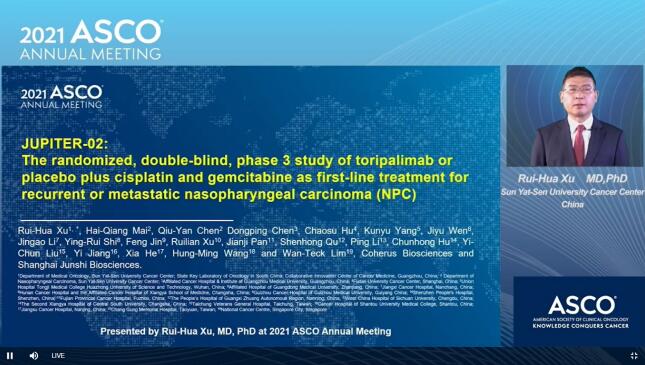In the morning of June 7th, 2021 (Beijing time), Prof. Xu Ruihua, President of Sun Yat-sen University Cancer Center, was invited to give a talk at the annual meeting of the American Society of Clinical Oncology (ASCO), a global academic event focusing on the latest oncology breakthroughs. This was the first time that research led by Chinese scholars was selected as the Late-breaking Abstract (LBA) of the ASCO annual meeting, reflecting the advances in clinical research design and trials led by Chinese researchers and the development of China's innovative drugs has now been widely recognized by the international oncology community.
A total of 35 centers in mainland China, Taiwan, and Singapore participated in the study. All of which were located in the high-risk areas for nasopharyngeal carcinoma (NPC). Under the guidance of Prof. Xu, all the centers completed the recruitment for clinical trials within one year.
In February 2021, based on a study (POLARIS-02 study) led by Prof. Xu to treat relapsed/metastatic NPC with second-line immunotherapy (POLARIS-02), toriplizumab, was approved by the Chinese National Medical Products Administration for the treatment of patients with recurrent/metastatic NPC who failed second-line and above systemic treatments. It has become the world's first immunotherapy drug approved for NPC indications.

The addition of toripalimab, a humanized IgG4 monoclonal antibody targeting PD-1, to first-line gemcitabine and cisplatin (GP) chemotherapy followed by toripalimab maintenance therapy succeeded in improving all efficacy endpoints compared with GP alone among patients with recurrent/metastatic NPC within the randomized, placebo-controlled, phase III JUPITER-02 trial. According to a blinded independent central review, median progression-free survival (PFS)—the primary endpoint—reached 11.7 months with the chemoimmunotherapy regimen compared with 8.0 months with chemotherapy alone, resulting in a 48% reduction in the risk of disease progression.
Other significant improvements observed with toripalimab plus GP chemotherapy compared with placebo plus GP chemotherapy included increases in the objective response rate (77.4% vs. 66.4%; p = 0.0335) and the median duration of response (10.0 vs. 5.7 months; p = 0.0014). Although the median overall survival (OS) was not mature in either arm, at the time of analysis, the toripalimab arm conferred a 40% reduction in the risk of death compared with the placebo arm (HR 0.603, 95% CI [0.364, 0.997]; p = 0.0462), with 2-year OS rates reaching 77.8% and 63.3%, respectively.
“Toripalimab, in combination with gemcitabine and cisplatin, may represent a new standard of care for first-line treatment of recurrent/ metastatic NPC,” said by Prof. Xu, during his plenary session presentation.
